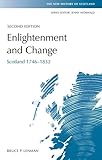Enlightenment and Change : Scotland 1746-1832 / Bruce Lenman.
Material type: TextSeries: New History of Scotland : NHSPublisher: Edinburgh : Edinburgh University Press, [2022]Copyright date: ©2009Description: 1 online resource (288 p.)Content type:
TextSeries: New History of Scotland : NHSPublisher: Edinburgh : Edinburgh University Press, [2022]Copyright date: ©2009Description: 1 online resource (288 p.)Content type: - 9780748625147
- 9780748630790
- 941.107 22
- online - DeGruyter
| Item type | Current library | Call number | URL | Status | Notes | Barcode | |
|---|---|---|---|---|---|---|---|
 eBook
eBook
|
Biblioteca "Angelicum" Pont. Univ. S.Tommaso d'Aquino Nuvola online | online - DeGruyter (Browse shelf(Opens below)) | Online access | Not for loan (Accesso limitato) | Accesso per gli utenti autorizzati / Access for authorized users | (dgr)9780748630790 |
Frontmatter -- Contents -- Preface -- 1. Scotland on the Eve of the Agricultural and Industrial Revolutions -- 2. The Age of Islay 1746–1761 -- 3. Integration and Expansion 1760–1775 -- 4. Scotland and the American Revolution 1775–1784 -- 5. The First Phase of the Dundas Ascendancy 1784–1793 -- 6. The Melvilles and their System under the Pressures of War 1793–1815 -- 7. Change: The Underlying Time Bomb 1790–1815 -- 8. The Last Hurrahs of the Old Regime 1815–1827 -- 9. Meltdown and Reconfiguration 1827–1832 -- Conclusion: Enlightened Change? -- Selected Further Reading -- Appendix: Chronological Table -- Index
restricted access online access with authorization star
http://purl.org/coar/access_right/c_16ec
The period from the Jacobite rebellion (1745) to the Scottish Reform Act (1832) saw the rise of some of the most influential thinkers of the contemporary world. Bruce Lenman provides a compact survey of developments in Enlightenment Scotland.The Reform Act spelled the end of political and social systems that had presided over industrial and agricultural revolutions turning Scotland from a rural society to one of the most urbanised and industrialised of European nations. Scotland also moved from being simply an active participant in the cultural life of western Europe to being a leader in a new, more expansive, Atlantic and European world where the ideas of its great Enlightenment thinkers circulated from Moscow to Philadelphia.The political framework for changes was the Union of 1707 which incorporated Scotland into the United Kingdom of Great Britain, and after 1800 Great Britain and Ireland. However, within the UK a distinctive political system run for most of this period by either the Dukes of Argyll or the so-called 'Dundas Despotism' dominated Scotland. This volume studies how that system first stimulated and exploited cultural and economic change and then was finally destroyed by it.This book is a revised and expanded edition of Integration and Enlightenment (Edinburgh University Press, 1993).Key Features:*discusses agricultural and industrial revolutions*considers Scottish urbanisation*examines the impact of mass migration and the Highland Clearances on Gaelic society*assesses the development of the Enlightenment thought through influential figures such as economist Adam Smith, philosopher David Hume, artist Henry Raeburn and architects the Adam brothers.
Mode of access: Internet via World Wide Web.
In English.
Description based on online resource; title from PDF title page (publisher's Web site, viewed 29. Jun 2022)


